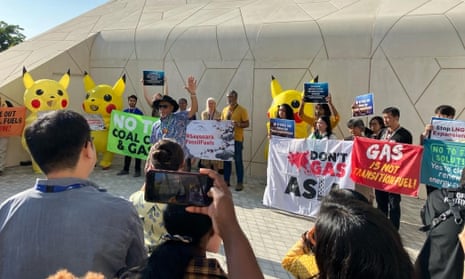Key events
New Zealand has won an award at Cop28. Unfortunately it is not one to be proud of. Each day, the Climate Action Network is branding one country the “fossil of the day” – an award for the most bone-headed and regressive climate action.
Yesterday, it was given to New Zealand because of the newly-formed government’s choice to overturn the existing world-leading ban on new oil and gas exploration. Christopher Luxon, the new prime minister, has vowed to open the country’s vast ocean to more oil and gas exploration, rowing back on his predecessor Jacinda Ardern’s 2018 ban.
Climate Action Network says:
“Does climate change minister Simon Watts not hear the climate alarm bells ringing? He may underestimate the devastating climate consequences of this decision but we, and their Pacific island neighbours in Palau, who slammed his intentions as ‘TRAGIC’, certainly do not.
“Minister Watts may be new to his role but we remember the decade-long campaign led by Indigenous Māori communities who succeeded in achieving a ban on oil and gas exploration in New Zealand’s oceans. Not only does Watts and the rest of the New Zealand government want to remove the country’s legacy of climate leadership but they also seek to redefine legislative interpretation of the country’s founding treaty with Māori communities, to reassess Treaty-based policies, and to roll back official use of Māori language – undoing the progress made between Māori and government relationships.”
Most of the world does not have fossil fuel phase out plan – report
A new report has found that global net zero targets are at risk because the majority of countries have not set proper targets to stop using fossil fuels.
Net Zero Tracker has today released the stark data showing the chasm between global net zero targets and the action needed to make them happen. It has found that net zero targets cover 88% of global GHG emissions, but only 7% of those emissions are covered by any kind of national commitment to phase-out exploration, production or use of coal, oil or gas. In total, 13% have pledged a full phase-out of any fossil fuel.
The report says that 94% of oil-producing countries have not set an oil exploration phase-out pledge, with a similar number (95%) failing to commit to phase-out gas exploration.
The lack of plans is encouraging the expansion of fossil fuels, the study finds.
Natasha Lutz, co-data lead, net zero tracker (University of Oxford), said:
“Phasing-out fossil fuels is a key element of realising credible pathways to net-zero. A lack of commitment at the country level leaves the door open for fossil fuel expansion and is inconsistent with achieving the temperature goals set out by the Paris Agreement.
“This proliferation of net-zero ambition without the commitment towards fossil-fuel phase-out highlights the need for entities to determine how these targets will be achieved. A pledge without a plan for implementation is at risk of becoming a bumper-sticker; broadcasted but never taken seriously.”
Al Gore: phase out would be one of ‘most significant events in history of humanity’

Oliver Milman
In an exclusive interview with the Guardian, former US vice-president Al Gore has said an agreement by countries to phase out fossil fuels would be “one of the most significant events in the history of humanity”. He added that it is “absurd” to put a fossil fuel company CEO in charge of Cop28.
It would be a “welcome surprise” if world leaders agreed at the climate talks to call for an end to fossil fuels, but such a declaration would have “enormous impact” upon the world, Gore said at the gathering in the United Arab Emirates.
“If there were a decision here to surprise the world to say ‘OK we get it now, we’ve made enough money, we will get on with what needs to be done to give young people a sense of hope again and stop as much as suffering as possible and start the phase-out of fossil fuels’, it would be one of the most significant events in the history of humanity,” the former US vice-president said.
Read more below.
Sultan Al Jaber may not think a phase out of fossil fuels is necessary, but Pikachu certainly disagrees. My colleague Damian Carrington sends in this snap of an eye-catching protest for the ‘finance day’ of the summit.

Mia Mottley: ‘extreme weather records are tumbling, and our finance systems cannot cope’
The Prime Minister of Barbados and one of the world’s foremost negotiators on loss and damage, Mia Mottley, has kicked off finance day at Cop with a press conference.
She said: “We are living in the age of superlatives. Temperature and extreme weather records are tumbling, and our finance systems cannot cope”.
It may have surprised some that Mottley was so gracious and polite to Sultan Al Jaber after his comments yesterday, thanking him for his work on the summit. But she is a diplomat, and that is her role.
She said:
Adaptation, mitigation, loss and damage. Those have been the three areas that we have been focused on for the last few years. This has probably been the most progress we’ve seen in the last twelve months on finance but we’re not where we need to be at, so first of all I want to give thanks and I really do want to give thanks to Dr Sultan for his leadership and determination that we should leave Dubai with progress even if we are not at the final destination.
“I want to give thanks to Dr. Sultan for his leadership and determination that we should leave Dubai with progress” – H.E. Mia Mottley, Prime Minister of Barbados pic.twitter.com/Jb59HUilLJ
— COP28 UAE (@COP28_UAE) December 4, 2023
Mottley also said that the oil and gas sector has to be at the table when it comes to negotiating on decarbonisation, as do banks and the finance sector.
Barbados PM Mia Mottley: Those who regulate banks, and determine credit ratings should be part of the climate conversation.
She says the oil & gas sector also has be at the table.
“You cannot say that it’s 1.5C to stay alive, and we continue to play with voluntary commitments” pic.twitter.com/pRAlXHSsfp
— Josh Gabbatiss (@Josh_Gabbatiss) December 4, 2023
Health agreement reached – but no mention of fossil fuels
Nina Lakhani
Yesterday, 123 countries signed the first ever Declaration on Climate and Health which included galvanising finance for climate and health solutions, and a commitment to incorporate health targets in their national climate plans.
The UAE announced an “aggregated” funding commitment of $1 billion towards the implementation of health-focused climate activities, money which comes from agencies including the Green Climate Fund, the Asian Development Bank and the Rockefeller Foundation. But, and it’s a big but, it’s unclear how much of this money is new money, and it’s also unclear whether it will take the form of grants or yet more debt for vulnerable nations.
And while the declaration acknowledged that reducing climate health impacts will require emission reductions, there is not a single mention of fossil fuels – which is a bit like having an alcoholism prevention plan without mentioning alcohol.
Opening summary
Good morning! This is Helena Horton, bringing you coverage from the fifth day of the UN’s Cop28 climate summit.
It’s likely to be an interesting day as the fallout from my colleague Damian Carrington’s scoop continues. Many experts viewed it as a ‘mask-off’ moment when Cop28 president Sultan Al Jaber told a meeting that there was “no science” behind demands for a phase-out of fossil fuels. Scientists have reacted strongly to the news, calling it “astonishing” and “farcical”.
The Guardian will be liveblogging the negotiations throughout. You can email me at [email protected] or on X/Twitter at @horton_official, and my colleague Sandra Laville ([email protected], @sandralaville) will take over later on.
Today’s official themes are finance, trade, gender equality and accountability, so expect reports and news focused on those themes, as well as on the wider negotiations.
In the meantime, here are some of yesterday’s key events:
-
Sultan Al Jaber, the UAE president of the Cop28 climate talks, told a meeting that there was no science showing a phase-out of fossil fuels was necessary to limit global heating to 1.5C (2.7F) above preindustrial levels. The Guardian and the Centre for Climate Reporting revealed Al Jaber’s comments.
-
Protesters at the conference called for a ceasefire in Gaza.
-
Indigenous groups condemned the murder of an activist in Peru.
-
The UK prime minister, Rishi Sunak, faced criticism over his climate policies and fleeting visit as leader of the opposition Keir Starmer stayed in Dubai to meet world leaders.

